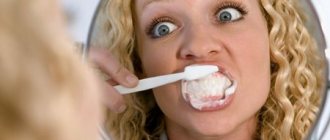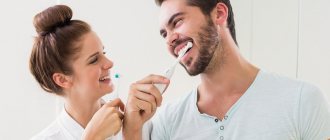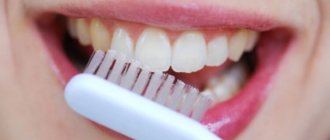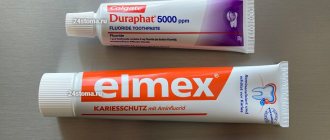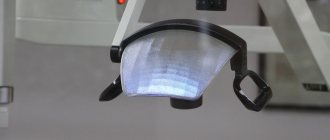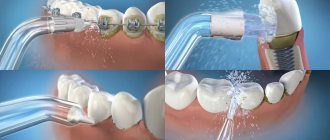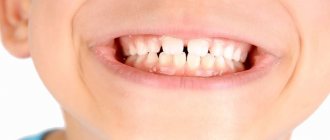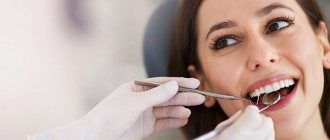Author of the article:
Soldatova Lyudmila Nikolaevna
Candidate of Medical Sciences, Professor of the Department of Clinical Dentistry of the St. Petersburg Medical and Social Institute, Chief Physician of the Alfa-Dent Dental Clinic, St. Petersburg
The appearance of dental plaque is a natural process that cannot be avoided. Coffee, red wine, coloring foods and dishes, smoking, drinking poor-quality water - all this leads to teeth acquiring an unaesthetic dark shade. But is it possible to get rid of this unpleasant manifestation? Of course you can. First, you should have your teeth professionally cleaned by your dentist regularly. And secondly, it is important to use high-quality anti-plaque toothpaste.
In the beginning there was sand and chalk
Toothpaste and brush are everyday things with which our day begins and ends. However, they were once a real luxury. The ancient Egyptians were the first to think about oral hygiene and began to use sand, ash, ground stones and animal horns as a cleaning agent, and their own finger replaced the brush. In the 4th century BC. The great healer Hippocrates recommended using mixtures of pumice with the addition of wine vinegar, which are more gentle on tooth enamel, to prevent dental diseases. At the end of the 18th century, little had changed. For example, the British brushed their teeth with powders that included crushed brick, crushed bark and coal chips.
The prototype of modern toothpaste was invented by Americans in the 19th century. This time there were no stones or ash. Teeth cleaning products were a mixture of chalk powder, neutral soap and aromatic additives. It was only in 1873 that Colgate released the first toothpaste in glass jars, which replaced tubes two decades later. They were invented by dentist Washington Sheffield of New London. But Colgate beat the inventor by quickly registering a patent for itself. An interesting fact is that in Russia, most people at that time continued to brush their teeth with chalk-based powder, and only in the 50s it became possible to buy a familiar tube of toothpaste in stores.
Best toothpaste
Which toothpaste is better? Definitely one that meets a person’s needs and suits his indications. Until recently, the main task of toothpaste was to help the brush clean teeth from plaque. Today, modern manufacturers of hygiene products have expanded its functionality and began to offer special medicinal toothpastes, both complex and for targeted solutions to specific problems. Today you can find tubes not only for the prevention of caries, but also for bleeding gums, against the formation of tartar, paste for implants or smoker’s plaque, for fresh breath or restoring the pH balance of the oral cavity, as well as for much more. But, in fact, all pastes are divided into several varieties, which we will consider.
Preventive measures
As those smarter than us say, the best way to solve a problem is to prevent it from happening. Proper dental care can prevent problems from occurring. In this case, we are talking about protecting tooth enamel from childhood - fortunately, children's toothpaste not only has a beautiful design, but also a very pleasant taste, so you don’t have to force anyone.
In this case, it is very important to choose the right toothpaste. It is better to give preference to professional brands rather than mass market products.
A striking example in this regard is the Splat brand.
Pastes for the prevention of dental caries
Toothpastes for the prevention of caries are recommended for increased susceptibility to the formation of caries bacteria, as well as as restorative therapy after teeth whitening. They saturate dental tissues with useful minerals, prevent the growth of carious bacteria, and also fight the formation of plaque. To strengthen teeth, fluoride compounds are added to such pastes. It is contained in such pastes as “Day and Night” Swiss Smile, Enzycal 950 CURAPROX, Mirafluor C Miradent, “Power of a Smile” Jason and others. Fluorine is an important microelement, since it is the one that participates in the metabolism of calcium, and, therefore, ensures its presence in the enamel. But it is worth remembering that it is extremely toxic, so its amount entering the body should not exceed the established norm. People living in areas with fluoride-saturated water (more than 1.2 mg/l) are advised to use fluoride-free toothpaste. You can find out about the fluoride content in the water in your area by calling the nearest Sanitary and Epidemiological Station.
Toothpaste
Theodent Classic
Pastes against tooth sensitivity
There are special toothpastes for sensitive teeth. They contain potassium chloride, potassium citrate (Twin Lotus Recipe for Sensitive Teeth, Mirasensitive hap+) or strontium chloride. These substances “clog” the dentinal tubules and reduce hyperesthesia. They also saturate the tooth enamel with minerals, the deficiency of which is most often the cause of increased sensitivity of enamel and dentin. But the most progressive substance today is considered to be hydroxyapatite (Sensitivity Control Biorepair). Its crystals are similar in composition to tooth enamel, so they effectively combine with it, restoring the natural protection of teeth. Pastes for sensitive teeth should not contain a drop of chemical bleaches and, instead of coarse calcium carbonate, should contain gentle abrasive substances with a smaller particle diameter, for example, silicon oxide. Such pastes are recommended for hypersensitive teeth, as well as for use during and/or after teeth whitening procedures.
Sensitivity Control Biorepair toothpaste
Is there a way out?
As popular wisdom says, almost any problem can be solved. Most often, when people discover darkened enamel, they run to the dentist and ask to urgently eliminate this defect. The whitening procedure undoubtedly gives an excellent, immediately visible result, but it requires quite a lot of money, which is not acceptable for everyone. In addition, this kind of action is very harmful to our teeth, not to mention the fact that the result cannot be called durable.
There is also a less expensive option for solving this problem - disposable whitening trays, which can be found in almost any pharmacy. However, they also cannot boast of the longevity of the effect.
Finally, there are a number of folk methods for eliminating this problem: you can find a lot of information about the benefits of activated carbon, salt or soda for these purposes. However, calling these procedures effective can only be a stretch, and you often have to worry more about safety than about the whiteness of your teeth.
Pastes for strengthening gums
Toothpastes aimed at preventing and reducing periodontal inflammatory processes reduce bleeding gums, help strengthen them, have an astringent effect, and also destroy harmful microbes. They most often contain antibacterial substances, for example with chlorhexidine, as in Curaprox ADS 712 paste, together with plant extracts that have an anti-inflammatory effect, such as edelweiss and echinacea in the SWISS SMILE vitamin herbal paste or witch hazel and calendula in the Plus Parodontgel BioRepair paste. Some of them also contain chlorophyll and vitamin E. All of these substances have a beneficial effect on gum tissue, accelerating the healing process and the formation of new cells. Such pastes are recommended for diseases of stomatitis, gingivitis and periodontitis.
Toothpaste Curasept ADS 712 CURAPROX
Clinical researches
Repeated clinical studies have proven that regular use of preventive toothpaste ASEPTA SENSITIVE for a month can reduce bleeding gums by 62%, reduce sensitivity of teeth and gums by 48% and reduce inflammation by 66%.
Sources:
- Report on determining/confirming the preventive properties of toothpaste “ASEPTA PLUS” GENTLE WHITENING” Author: doctor-researcher A.A. Leontyev, head Department of Preventive Dentistry, Doctor of Medical Sciences, Professor S.B. Ulitovsky First St. Petersburg State Medical University named after. acad. I.P. Pavlova, Department of Preventive Dentistry
- Clinical studies of antisensitive toothpaste “Asepta Sensitive” (A.A. Leontyev, O.V. Kalinina, S.B. Ulitovsky) A.A. LEONTIEV, dentist O.V. KALININA, dentist S.B. ULITOVSKY, Doctor of Medical Sciences, Prof. Department of Therapeutic Dentistry, St. Petersburg State Medical University named after. acad. I.P. Pavlova
- The role of anti-inflammatory rinse in the treatment of periodontal diseases (L.Yu. Orekhova, A.A. Leontyev, S.B. Ulitovsky) L.Yu. OREKHOVA, Doctor of Medical Sciences, Prof., Head of Department; A.A. LEONTIEV, dentist; S.B. ULITOVSKY, Doctor of Medical Sciences, Prof. Department of Therapeutic Dentistry of St. Petersburg State Medical University named after. acad. I. P. Pavlova
- Report on determining/confirming the preventive properties of toothpaste “ASEPTA PLUS” COFFEE and TOBACCO Author: doctor-researcher A.A. Leontyev, head Department of Preventive Dentistry, Doctor of Medical Sciences, Professor S.B. Ulitovsky. First St. Petersburg State Medical University named after. acad. I.P. Pavlova, Department of Preventive Dentistry
Pastes against bad breath
The action of toothpastes that help fight halitosis is aimed at restoring the normal balance of oral microflora, the disruption of which is usually accompanied by excessive proliferation of anaerobes. These substances emit volatile sulfur-containing products that have a pungent odor. Anti-bad breath pastes contain components that suppress pathogenic microflora and act on viruses. In addition, such pastes eliminate dry mouth syndrome, which can also cause halitosis. Antihalitic hygiene products are recommended for bad breath caused by microflora disturbances and dry mouth.
Enzymatic toothpaste gel
Jason Enzyme Brightening
Composition of toothpaste - which is better?
A dental hygienist can help you figure out which toothpaste is best for specific oral problems. When purchasing a product yourself, you need to pay attention to whether it contains substances potentially harmful to teeth. For example, coarse abrasive substances that negatively affect tooth enamel. These may be chalk or calcium carbonate, as well as aluminum oxides, which are prohibited in some countries. Nowadays, silicon dioxide is considered the best abrasive; it gently removes all dental plaque without having a negative effect on the enamel and gums. You can also find other safe abrasive substances in paste compositions—dicalcium phosphate or sodium metaphosphate.
You should be careful with toothpastes that contain triclosan or chlorhexidine. Brushing with such pastes may be necessary to treat inflammation in the gums or to eliminate bad breath. However, long-term use (more than 3 weeks) of paste with antibacterial substances can lead to disruption of the beneficial microflora of the oral cavity. If sodium lauryl sulfate is in one of the first places in the description of the composition (that is, its percentage is large), then it is also better not to buy such a paste. The fact is that this surfactant is responsible for foaming, but does not in any way affect the quality of cleaning. In addition, it has long been proven that even in small doses, sodium lauryl sulfate can negatively affect the body. This component is contained in all pastes from Blend-a-med, Colgate, Oral-B, Aquafresh, Karimed, Forest Balsam, some pastes from Lacalut, SPLAT, PresiDENT, and New Pearl.
Kinds
Despite the fact that the brand is less popular than its more advertised competitors, one cannot complain about the paucity of the product line.
If we analyze the reviews, Splat toothpaste is most often purchased specifically for enamel whitening. The most popular in this regard are black toothpaste “Splat Blackwood” and Extreme white for intense color change. Both types, according to reviews, have a powerful antibacterial effect and freshen breath for a long time.
The Splat Blackwood paste, containing juniper berry extract, Karelian birch charcoal and Biosol antiseptic, deserves special praise in the field of whitening. In addition to the quite obvious qualities of whitening, freshening breath and caring for the oral cavity, this paste boasts another feature - thanks to the black color of the product, the result becomes even more noticeable as a result of the contrast with the whiteness of the enamel.
The manufacturer offers three full product lines at once: Junior, Professional, which includes the equally popular Splat Biocalcium toothpaste, and Special, which includes fast-acting products.
In addition, there is the Express line, which presents more compact, ergonomic, so to speak, product options, various teeth cleaning devices, from brushes to dental floss, and miniature, easy-to-use travel kits.
How much does toothpaste cost and where to buy it?
The price of toothpaste varies from 50 to 1,000 rubles per tube, and sometimes can exceed this threshold. Some people think that expensive pastes are the best, others don’t see the difference in all the variety and buy the cheapest one. In both cases, the buyers are wrong. A high price does not always indicate the quality of a product, and buying cheap pastes is simply dangerous - they may turn out to be a fake or a product not manufactured in accordance with GOST. Where to buy toothpaste? This is best done in pharmacies and specialized stores, such as Startsmile Shop. You should not buy pasta in underground passages, at the market, on the train, or from “distributors.”
The choice of toothpaste determines many things - the appearance of teeth and gums, the condition of the enamel and its saturation with essential microelements. However, even the best toothpaste is not able to protect teeth from caries and gums from inflammation if cleaning is carried out quickly, poorly, incorrectly and irregularly.
Is it possible to use anti-plaque pastes in children?
Unfortunately no. Baby teeth are very fragile and delicate. Therefore, no pastes with abrasives can be used in children. Children should choose special children's pastes depending on their age.
It is important for parents to teach their children to prevent plaque formation. You should brush your child’s teeth in the morning and evening, and also allow him to chew carrots and hard apples. Vegetables and fruits will help remove plaque naturally and also provide gum massage. But adult toothpastes can be dangerous for children.

